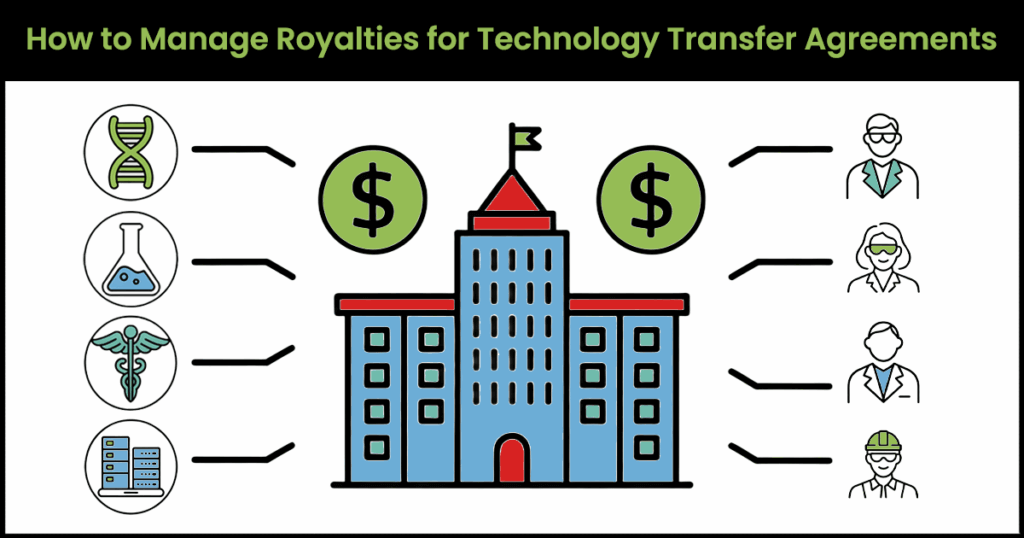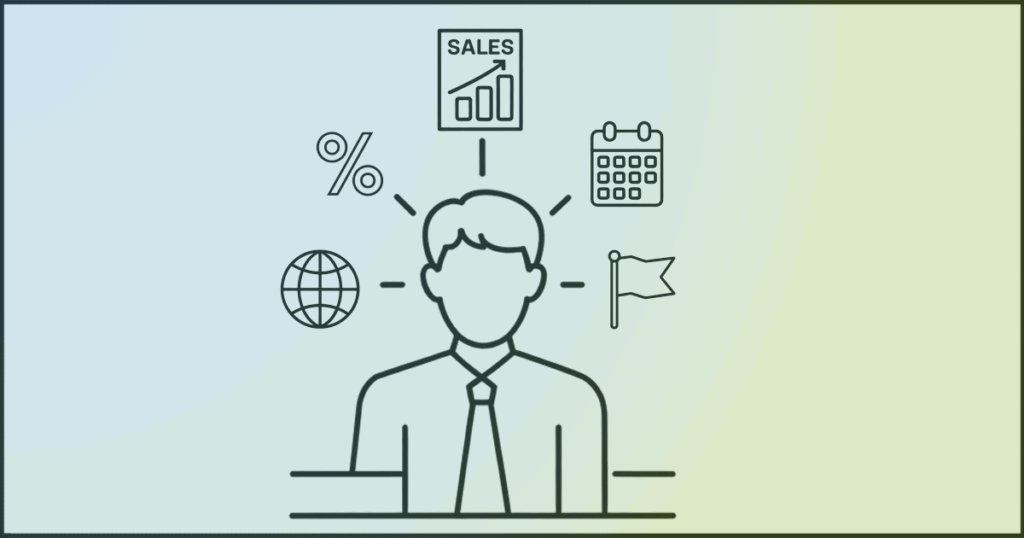How to Manage Royalties in Technology Transfer Agreements
If you’re involved in licensing technology from a university, research institution, or federal lab—or granting those rights to others—managing royalties is one of the most critical (and complex) parts of the process. In this blog post, you’ll learn exactly how royalties work in technology transfer agreements, what responsibilities fall on both licensors and licensees, and how to stay compliant while minimizing administrative headaches. In short, you need a clear understanding of the agreement terms, airtight recordkeeping, and the right tools to stay organized.
Organizations managing technology transfer agreements find that MetaComet’s automation tools eliminate the administrative headaches while maintaining compliance and accurate recordkeeping.

What is the purpose of a technology transfer agreement?
The term “technology transfer agreement” (or TTA) most commonly refers to a legal contract that outlines the terms under which one party (often a research institution, university, or company) grants another party (or licensee) the right to use, develop, or commercialize a specific technology. The primary purpose of a technology transfer agreement is to facilitate the legal and practical transfer of intellectual property (IP) from one entity to another.
Specific purposes of the agreement include:
- Enable Commercialization: It allows the recipient (licensee) to commercialize or apply a technology developed by the provider (licensor) and adapt that research or innovation into marketable products or services.
- Protect Intellectual Property Rights: It clearly defines how the IP can be used, what rights are granted (e.g. exclusive vs. non-exclusive), and how ownership is handled, helping to avoid disputes.
- Define Roles and Responsibilities: It sets clear expectations regarding each party’s obligations, such as development milestones, performance criteria, or support from the licensor.
- Establish Financial Terms: It details payment structures such as upfront fees, royalties, milestone payments, or equity stakes, ensuring both parties are fairly compensated.
- Regulate Confidentiality: It ensures that proprietary or sensitive information related to the technology is kept confidential, often through non-disclosure clauses.
- Promote Collaboration: It can facilitate partnerships between academic institutions and industry, encouraging innovation and practical application of research findings.
- Comply with Legal and Ethical Standards: It ensures compliance with laws and regulations, such as export controls, competition laws, and ethical guidelines, especially in sensitive fields like biotechnology or defense.
What are technology transfer agreements?
Various types of agreements enter into the tech transfer process.
- The term “technology transfer agreement” usually refers to the license agreements which are core to the process of bringing inventions to market. These are the agreements in which the research institution (or licensor) grants permission for a commercial entity (the licensee) to use, adapt, and monetize the invention. In return, the licensee pays fees or percentage-based royalties to the licensor.
- Employment agreements usually cover the terms by which institutions and employee researchers share the revenue earned through any license agreements.
- Material Transfer Agreements (MTAs) govern the transfer of research materials between parties, for the purpose of further research.
- A CRADA, or Cooperative Research and Development Agreement, enables federal laboratories to collaborate with other entities on research and development projects.
- Non-disclosure agreements (NDAs) or confidential disclosure agreements (CDAs) are often applied in advance of a license agreement. The potential licensee may request access to confidential information about the IP in question in order to estimate its value. The NDA or CDA requires them to maintain the confidentiality of such information.
Automate Your Technology Transfer Agreement Management!
MetaComet® Handles Complex IP Types and Distribution Requirements.
Multiple agreement types, diverse IP licensing, complex revenue distributions, various stakeholders – why struggle with these technology transfer agreement complexities when our automation tools handle everything? Save 90% of your revenue distribution management workload. Find out how: talk to our team of royalty experts today.
What types of intellectual property may be licensed under a technology transfer agreement?
The licensed materials in a technology transfer agreement are often, but not necessarily, scientific or technological inventions. They may or may not be copyrightable material, patents, or trademarks. The two things they all have in common is that they are newly created and have some sort of commercial value.
Some types of IP that are often licensed in tech transfer agreements include:
- Data
- Software
- Machines
- Processes
- “Know-how”
- Tangible property
- Chemicals
- Drugs
- Genetically modified organisms
Who receives revenue from technology transfer agreements?
A tech transfer license agreement will define the fees and royalties to be paid to the licensor. In turn, that institution, depending on its own policies and agreements, will pay out distributions to various parties that enabled the research, possibly including:
- Inventors
- Creators
- Authors
- Developers
- Contributors
- Faculty
- Research programs
- Labs
- Departments
- Beneficiaries of the parties listed above
How are royalties involved in a technology transfer agreement?
Royalties play a central role in many technology transfer agreements as a way for the licensee to compensate the licensor. The licensee will make periodic payments to the licensor based on a percentage of sales, a fixed amount per unit sold, or usage rates. Royalty-related clauses in a TTA will typically include:
- Royalty rate (e.g., 3% of net sales)
- Payment schedule (e.g., quarterly or annually)
- Audit rights (allowing the licensor to verify reported sales and royalty payments)
- Duration of royalty obligations
- Territorial limits (where the royalties apply)
- Exclusions or reductions (e.g., reduced royalty rates for certain markets or sublicenses)
- Minimum royalties (which set minimum payments, even if the licensee doesn’t sell or use the technology as expected)
- Milestone payments (which may be tied to certain tiers of sales volume)
What does a technology transfer office need to know about royalties and distributions for technology transfer agreements?
To effectively manage royalties and distributions arising from technology transfer agreements, a licensor’s technology transfer office (TTO) needs to have a strong grasp of both the financial and administrative aspects of royalty management, while ensuring compliance with institutional policies, legal requirements, and stakeholder expectations. Specifically, the TTO must:
- Record and understand the agreement terms
- Develop a systematic process to track and collect royalties, including:
- Monitoring reporting deadlines
- Validating royalty reports submitted by licensees
- Ensuring timely payments and following up on delays or discrepancies
- Flagging underreporting or missing payments
- Distribute royalty income following institutional and/or legal policies
- Ensure tax and legal compliance
- Communicate with stakeholders including inventors, beneficiaries, etc.
- Maintain records to help with audits, disputes, and ongoing license management
What does a licensee need to know about royalties for technology transfer agreements?
Like the licensor receiving the royalty payments, the licensee making the payments needs to have a clear record and understanding of the agreement terms, in particular:
- How royalties are to be calculated:
- Revenue basis: know whether royalties are based on gross revenue, net profit, or units sold.
- Net sales definition: this can vary by agreement
- Bundled products: if the licensed IP is sold as part of a bundle or kit, the agreement must define how royalty-bearing revenue is allocated
- Sublicensing obligations
- Audit and reporting requirements: most licensors require:
- Regular royalty reports and payments
- Detailed records of sales, deductions, and sublicensing
- The right to audit licensee books to verify royalty accuracy
- Payment terms and penalties
- Understand when payments are due
- Know if interest accrues on late payments
- Be aware of penalties for non-compliance
How can MetaComet® help?
Whether you’re a TTO or a licensee, MetaComet® can automate the calculation, payment, and tracking of all your payments related to technology transfer agreements.
- TTO’s: easily aggregate royalty statements from all your licensees to calculate and pay out distributions instantly
- Licensees: automatically process all your sales files to calculate and pay royalties while maintaining a clean and audit-ready reporting trail
Whichever side of the tech transfer agreement you’re on, MetaComet can save you time, minimize risks, and eliminate the stress around technology transfer payments. Contact us to discuss your needs and find out how MetaComet can work for you.

David Marlin is the President and Co-Founder of MetaComet® Systems, a prominent provider of royalty automation tools. Since founding the company in 2000, David has spearheaded the development of a suite of best-in-class systems that effectively facilitate royalty processes for nearly 200 publishers. David has also served as the chair for The Book Industry Study Group’s Rights Committee and Digital Sales Committee.
Before establishing MetaComet Systems, David served as a technology consultant for renowned publishers, collaborating with notable companies such as Random House, Penguin, HarperCollins, Holtzbrinck, Macmillan, Scholastic, Time Warner, and many others. David holds both an MBA and a BA from Columbia University in New York.
Contact Us
"*" indicates required fields


